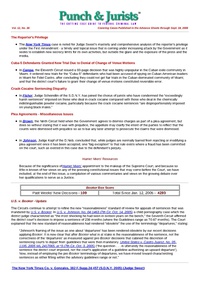Evidence was sufficient to establish that prosecutor acted with a discriminatory purpose when he used peremptory strikes against African-American jurors in petitioner's murder case, in violation of rule established in Batson v. Kentucky.
Here the Third Circuit affirmed the grant of a writ of habeas corpus after concluding …
In this case, the Court explored when the mandatory application of the Sentencing Guidelines constitutes harmless error. It stated: "Once the Supreme Court fundamentally altered federal sentencing procedures by ruling in Booker that the Guidelines were no longer required to be applied, it became difficult for the Government to …
Judge Scheindlin started this decision by stating: "In the 11 years that I have served as a district court judge, I have been troubled by the exceedingly harsh sentences imposed on those who deal in crack cocaine. I find it unsettling, for example, that a defendant who deals five …
In 1998, the five defendants in this case (who subsequently became known as the “Cuba 5") were arrested on a criminal complaint; and they were subsequently indicted with nine co-defendants on a variety of charges including conspiring to act as agents of the Republic of Cuba without registering with …
Here a divided panel from the Second Circuit overturned a defendant's conviction for filing false excise tax returns after concluding that the district court had acted inappropriately in allowing argumentative summations by the prosecutor at the conclusion of each witness's testimony, thereby depriving the defendant of a fair trial. …
This case involved a Government subpoena of Nancy Bergeson, an Assistant Federal Public Defender, to testify against her own client, one Michael Casey, before a Grand Jury. Casey was indicted on drug charges involving the distribution of Ecstasy; and he decided to go to trial. When Casey failed to …
The defendant, Donna Johnson, a social service worker for the Nebraska Health and Human Services agency, pled guilty, pursuant to a Type C plea agreement (Fed.R.Crim.P 11(c)(1)(C)), to certain charges arising out of a scheme to defraud that agency and others by soliciting and receiving kickbacks. In exchange for …
This brief, per curiam decision is noted for an important principle governing the interpretation of plea agreements. The defendant pled guilty to 44 counts of various fraud charges (a number that, by itself, is obscene overkill). The Government promised to dismiss the remaining unspecified number of additional charges. However, …
Plaintiffs, five organizations and two individuals seeking to support the lawful, nonviolent activities of two organizations that had been designated as foreign terrorist organizations, filed a constitutional challenge to portions of the Antiterrorism and Effective Death Penalty Act (AEDPA) and the Intelligence Reform and Terrorism Prevention Act (IRTPA), specifically, …
This case is noted for Judge Sweet’s masterly and comprehensive analysis of the history, development and current status of the reporter’s privilege under the First Amendment; and he firmly endorsed that privilege as constitutionally sound.
This is not the case that sent Judith Miller, the reporter for The …
